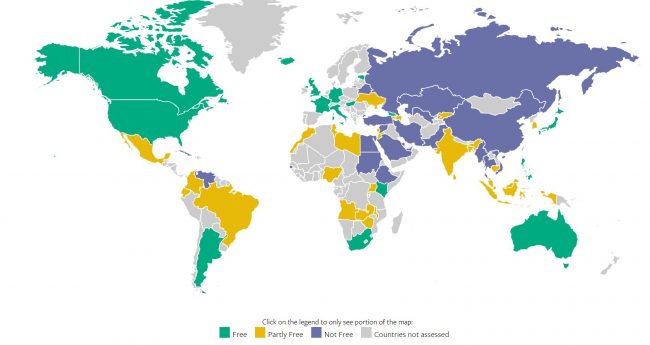

 Internet Freedom in Azerbaijan and Armenia have slightly deteriorated while Georgia has slightly strengthened its position, according to a recent Freedom House report.
Internet Freedom in Azerbaijan and Armenia have slightly deteriorated while Georgia has slightly strengthened its position, according to a recent Freedom House report.
On 14 November, the American rights group published their annual Freedom of the Net report.
On a scale from 0 to 100, with 0 being most free and 100 most repressed, Georgia scored 24, putting it on par with the United Kingdom. Azerbaijan scored 58, and Armenia 32, making them ‘partly free’, while Georgia strengthened its position as ‘free’.
The scores should not be confused with Freedom House’s Freedom in the World, which measures the degree of civil liberties and political rights in every nation, or Freedom of the Press reports.
The publication focuses on three major indicators — obstacles to access, limits on content, and violation of user rights, in the time period from 1 June 2016 to 31 May 2017.
Azerbaijan
Among developments in Azerbaijan in 2016–2017, the reports cites new legislation giving authorities ‘wide discretion to block content online, [which] was swiftly used to block several independent online media outlets’.
While the report underlined that a number of online journalists and social media users were detained for their online activity, the reports suggests that ‘self-censorship is pervasive among social media users, who are aware that they may face criminal charges for their expression online’. A number of journalists and commentators, especially if they are employed by state media outlets or pro-government platforms, have resorted to self-censorship, according to Freedom House.
The reports goes on to describe Azerbaijani human rights defenders being ‘targeted in a spearphishing campaign, in attempts to install malware on their devices and track their online activity’.
In terms obstacles to internet access, the reports said Azerbaijan lags behind its neighbours in areas such as internet speed and affordability.
Blocking of media websites, such as Azadliq (Radio Free Europe/Radio Liberty Azerbaijan), Azadliq Daily, Meydan TV, and Turan TV, were mentioned in the report.
Armenia
Internet freedom in Armenia has deteriorated by two points to 32 since 2016, according to the report, marking it as ‘partly free’.
The reasons for this include the brief blocking of Facebook in July 2016 amid clashes between an armed militant group and the authorities. When in April 2016 hostilities broke out between Armenian and Azerbaijani forces in Nagorno-Karabakh, online commentators were ‘encouraged to practice self-censorship’, according to the report.
However, the reports claims that in practice, the Armenian government and the telecommunications regulatory authority, the PSRC, ‘do not interfere with or try to influence the planning of network topology’.
The report also mentioned that Armenian police targeting journalists who livestreamed the Electric Yerevan protests in 2015, beating them and confiscating their equipment.
Georgia
Georgia has seen modest progress in Internet freedom since 2016 — increasing its score by 1. This marks Georgia a ‘free’ in terms of internet access and other indicators.
However, Georgia has the lowest rate of internet penetration compared to Armenia and Azerbaijan. Only half of Georgia’s population enjoys access to the internet, while 58% do so in Armenia and 78.2% in Azerbaijan.
The report noted the brief blocking of video-hosting platform Vimeo as the government attempted to restrict access to leaked videos featuring Georgian politicians; activists launching a digital campaign against surveillance laws; and new surveillance laws introduced in 2017 which attracted criticism for allowing excessive access to user data.
[Read on OC Media: Georgia’s perpetual system of illegal surveillance]
The report stated that while the number of internet and mobile subscriptions in Georgia continues to grow, high prices for services, inadequate infrastructure, and slow internet speeds, particularly for those in rural areas or with low incomes, ‘remain obstacles’. It also suggested that the government ‘lacks a comprehensive strategy outlining a clear and long-term vision for developing broadband internet infrastructure throughout the country’.
The report concluded that governments around the world have ‘dramatically increased their efforts’ to manipulate information on social media in 2017, with online content manipulation contributing to a ‘seventh consecutive year of overall decline in internet freedom’.









